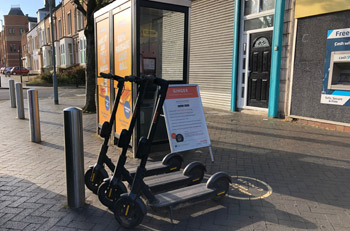The first Government report on e-scooter trials summarising findings from the data collected so far is expected shortly.
The trials were launched last year with authorities in London only joining this summer.
The interim report comes after casualty data on e-scooters released in September found there was one fatal incident and 484 casualties involving e-scooters, of these 384 were e-scooters users themselves.
The Department for Transport (DfT) said its 'best estimate, after adjusting for changes in reporting by police, is that there were 128 seriously injured and 355 slightly injured'.
A DfT official told Transport Network: 'There is data around safety. That has generated a few headaches for our analysts especially in terms of comparability.'

E-scooter trials are taking place in Middlesborough
There are more than 50 trials across over 30 areas currently taking place with 12 operators.
More than 66,000 e-scooters were approved for the trials, but only 19,100 are available per day. This has resulted in 100,000 active users, taking 8.6 million trips and 20 million km travelled.
A DfT spokesperson said: 'Safety will always be our top priority and the trials currently taking place across England are allowing us to better understand the benefits of e-scooters and their impact on public space.
'E-scooters could help ease the burden on our transport network while creating a green legacy. By encouraging a shift away from private cars, e-scooters can improve air quality and reduce greenhouse gas emissions across the UK as we build back greener.'
Riding a privately owned e-scooter on the roads remains illegal and a range of motoring offences apply to those riding outside of the trial areas.
The trials, which are taking place as part of the DfT's future transport studies programme, were originally only supposed to cover a handful of areas however the impact of COVID-19 saw the department keen to widen its scope.
This meant the programme was launched in some haste as the secondary legislation which was needed to allow the trials to take place had to be passed in under six weeks and was completed by July 2020.
The DfT set out clear regulations and guidance for users and rental providers to help keep everyone safe. E-scooters used in trials will:
- Have a maximum speed of 15.5mph.
- Be permitted on roads, cycle lanes and tracks where possible (but not on pavements/motorways).
- Need users to have a full/provisional car or motorcycle licence.
- Have a minimum user age of 16.
In addition, e-scooter operators in trial areas utilise ‘geofencing’ technology to reduce speeds in busy, contested areas and creating ‘no-go zones’.
They also provide a range of training options for users, both in-person and via online modules. e-scooters can present a hazard particularly to vulnerable groups if people use them incorrectly safety we don’t yet know how safe micromobility vehicles are or how they interact with other vehicles
In October 2020 the evaluation contract for the trials started. E-scooter operators are required to share data with the evaluators.
The DfT initially extended trials to February 2022, and have now announced they will be extended to November 2022.
A final report on the programme was expected by spring 2022, though this seems certain to be pushed back now.
A DfT official said the primary aim of the evaluation was 'to build robust evidence about the safety, benefits, public perceptions and wider impacts of e-scooters in order to inform legal changes that may be necessary after the trial period ends'.
The secondary aim was to 'understand how the local transport systems are working, what factors support or hinder this, and learn lessons for any future roll-out'.
A DfT official working on the programme said that before the launch little was known about how safe micromobility vehicles were or how they interact with other vehicles private use.
They added that e-scooters 'can present a hazard particularly to vulnerable groups if people use them incorrectly'.
Register now for full access
Register just once to get unrestricted, real-time coverage of the issues and challenges facing UK transport and highways engineers.
Full website content includes the latest news, exclusive commentary from leading industry figures and detailed topical analysis of the highways, transportation, environment and place-shaping sectors.
Use the link below to register your details for full, free access.
Already a registered? Login